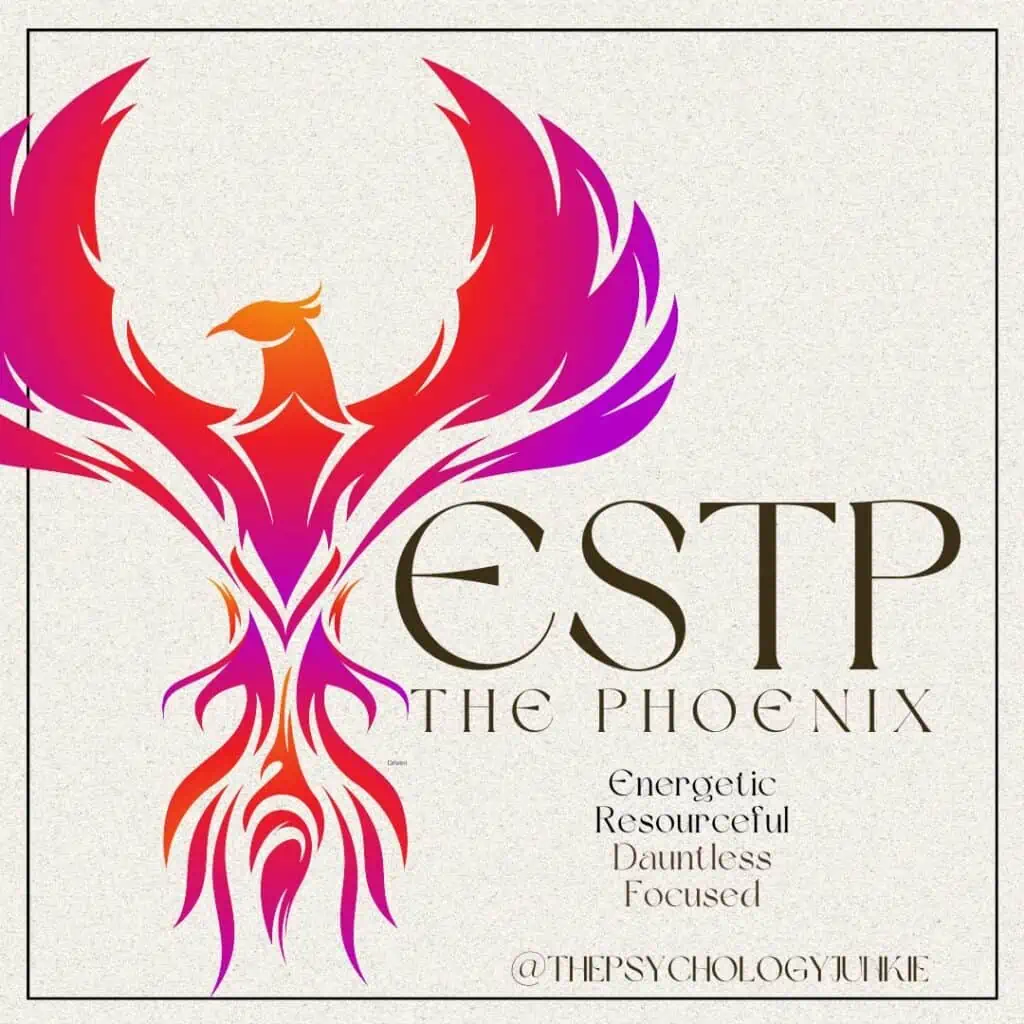ESTP Daredevils
are known for their exciting, action-oriented personalities and their skill at living totally in the moment. They are often called The Doers and it’s not hard to see why. Life is about taking action and spotting opportunities for this type. They enjoy a fast-paced lifestyle with new and exciting challenges at every turn. When it comes to decisions, they focus on logic, facts, and practicality. At the same time, they have a devil-may-care charm that makes them fun and thrilling to be around.
“You have enemies? Good. That means you’ve stood up for something, sometime in your life.”
Winston Churchill – ESTP
What Does ESTP Stand For?
E = Extroversion. ESTPs focus on the outer world of experiences, people, and events before focusing inwards.
S = Sensing. ESTPs focus more on the concrete, existing world than the world of theories and abstractions.
T = Thinking. ESTPs focus on the impersonal aspects of a decision (pros and cons, logic, cause and effect) before looking at personal impact and emotional dynamics.
P = Perceiving. ESTPs prefer having a flexible, spontaneous lifestyle. They tend to mix work with play rather than finishing one project before moving onto another.
ESTP Motivations and Weaknesses:
- Driving Force: To experience life in a fully immersive way. To chase adventure, make things happen, and seize the day!
- Backup Strength: An analytical and logical perspective on how things work together. A unique ability to find leverage points and troubleshoot in any situation.
- Weaknesses: May be so caught up in the moment that they lose sight of future consequences. May struggle to read-between-the-lines or anticipate the far-reaching effects of current actions.
- Stressors: A rigid, highly-structured schedule, emotionally chaotic environments, micro-management, lack of freedom, controlling relationships, having to sit still for too long.
ESTP Personality Traits:
Every individual has unique factors that make them totally one-of-a-kind. However, these are some common characteristics of average to healthy ESTPs:
- They have a spontaneous, casual approach to life
- They like to take action and make things happen
- They are usually very energetic and quick to respond to incoming data
- They are usually “street-smart” and clever
- They stay calm in crises’ and can think quickly in make-or-break situations
- They have a detailed and vivid storehouse of past experiences and facts
- They are very aware of what’s relevant in any given situation
- They focus primarily on the present moment
- They enjoy taking things apart to figure out how they work
Famous ESTPs:

There are many famous ESTPs that have changed the course of history. Here are just a few:
- Alexander the Great
- Winston Churchill
- Theodore Roosevelt
- George S. Patton
- Franklin D. Roosevelt
- John F. Kennedy
- Douglas MacArthur
- Arthur Conan Doyle
- James Randi
- Ernest Hemingway
- Thomas Edison
- Alfred Hitchcock
- Harry Houdini
- Jack Nicholson
- Madonna
- Helen Mirren
- Mila Kunis
ESTP Careers:

Needs: Action, variety, and independence
Despises: Boredom and stagnation
ESTPs are natural born entrepreneurs. They’re quick thinkers with a talent for understanding how to make deals, persuade, and achieve goals in the moment. While the risks of entrepreneurship can be daunting for some, ESTPs enjoy the rush and the challenge. They excel at thinking on their feet and coming up with spur-of-the-moment opportunities and tactics. Careers that allow them freedom to take charge and get things done in their own way will appeal to them. They can be highly productive when they’re allowed to work in bursts rather than at a slow, routine pace. Careers in sales, marketing, and emergency response are ones they excel in.
The ESTP’s weakness is anything that makes them feel bored or trapped. They want to be able to move quickly and take action. They also crave a lot of autonomy, so a job that requires them to be micro-managed or closely supervised will be a no-go for them. Lots of rote busywork and repetitive procedural tasks will send them sprinting for the exits.
Career Suggestions:
- Pilot
- Stockbroker
- Investigator
- Paramedic
- Investor
- Entrepreneur
- Performer
- Carpenter
- Engineer
- Marine biologist
- Salesperson
- Marketer
- Personal Trainer
- Professional Athlete.
ESTP Strengths and Talents:
Realism: I like to call ESTPs the “Ultimate Realists,” and this is thanks to their ability to stay firmly in the moment, focusing on facts, observations, and details. They notice what’s relevant and needed now and quickly spot resources that can be used to make an impact. This can look like rigging up a quick solution with whatever tools or materials are on hand or finding an unconventional way to tackle a problem when time is short. Their practical, no-nonsense approach allows them to make fast decisions that get immediate results, and they rarely waste time on abstract theories when real-world action is needed. For ESTPs, it’s all about what works now, and they have a rare ability to turn even chaotic situations into opportunities.
Problem-Solving: ESTPs have a knack for troubleshooting, even in dire situations. They can easily tune out needless distractions or anxious thoughts to get to the components of a problem. While some types need a lot of time to assess a problem and find a solution, ESTPs are all about expediency and efficiency. They figure out how something works in order to fix it or improve upon it. Often this involves taking the problem apart, looking at it from different angles, and testing different methods to find the most effective, low-effort solutions.
Boldness: ESTPs love a challenge or an adventure. Their minds are wired to look for surprise, incoming events and respond to them effectively. When life feels too predictable or routine they start to feel restless and agitated. Instead, they aim to push themselves to their limits, seizing the day and finding opportunities that make them feel truly alive.
Rationality: ESTPs focus on logic and facts when making decisions. Their mind automatically checks for logical inconsistencies or logical fallacies and tries to avoid them at all costs. They deal with complexity rapidly and rarely get lost in abstract musings. As realists, they trust what can be proven via evidence, real-life experience, and logic.
Humor: When I surveyed ESTPs about their greatest strengths, humor got more votes than nearly anything else. ESTPs love to make people laugh and they have a unique skill for “reading the room” and making wry observations that are both hilarious and astute. Charming and persuasive, they know how to ease the tension with a perfectly-timed witty comment or comeback.

Dominant Function: Extraverted Sensing (Se)
Extraverted Sensing focuses on action and immersion in the present moment. ESTPs are highly attuned to what’s happening now, the resources at their disposal, and the details of the world around them. They’re also highly attuned to their physical body and where they are in space. It’s easy for them to become “one” with their environment and navigate it with ease. This often shows up in being able to drive easily in new locations, find resources to use in crisis situations, or an ability to spot minute details that others miss.
Auxiliary Function: Introverted Thinking (Ti)
Introverted Thinking helps ESTPs to analyze, categorize, and evaluate information. It’s concerned with accuracy and clarity; helping ESTPs to check for logical inconsistencies, loopholes, and solutions that can be applied immediately. It also fuels their curiosity, giving them a desire to learn new facts and see those facts from many different angles. My ESTP husband, for example, read the entire World Book Encyclopia collection as a child so he could understand how everything in the world works. In short, that is the main desire of Introverted Thinking: To know how everything works in detail.
Tertiary Function: Extraverted Feeling (Fe)
Extraverted Feeling gives ESTPs an awareness of others’ emotions and the moods or “vibes” of the room they’re in. Thanks to this ability, they can easily read the room, rub shoulders, create witty banter, or spark a positive connection with another person. ESTPs enjoy swapping jokes, making people smile, laugh, argue, flirt, or have any kind of intense (usually positive) reaction to them.
Inferior Function: Introverted Intuition (Ni)
Introverted Intuition is the part of the ESTP’s mind that they tend to feel less sure about. This function focuses on inner ideas, future possibilities, and abstract thinking, which can be tricky for ESTPs. They might find it hard to plan far ahead or think about how their actions today could affect the future. Instead, they prefer focusing on what they can see, hear, and experience right now. But as they grow older, they might start using this part of their mind more, which helps them become better at planning and predicting what could happen next.
Dating an ESTP – What You Need to Know
ESTPs need to know that you won’t try to put them in a box, control them, or manipulate them. It can take them a while to truly commit to someone, but once they do they’re in it for the long haul. They look for someone who has a sense of adventure, who’s willing to laugh at themselves, and who has their own goals and dreams.
ESTPs want to show you a good time; this is one of the ways they show they care. Be willing to take risks, be spontaneous, and notice when they go out of their way to give you a good experience. Whatever you do, don’t rush them, micro-manage them, or emotionally manipulate them. The more you try to force a decision from an ESTP, the more likely he is to want to get out from under the relationship.
Recapping What Works and What Doesn’t:
- Be open-minded and up for an adventure.
- Be flexible and willing to see each other’s point of view
- Don’t pressure them to make big decisions or commitments.
- Don’t over-schedule their time.
- Experience and enjoy the moment!
- Compliment them on their appearance, abilities, and strengths.
- Be direct and clear about your feelings/desires.
How ESTPs Show They Care:
When an ESTP cares, they’re all in, riding the highs and sticking by you through the lows. They’re your partner-in-crime, the one who’ll cheer you on, laugh with you, and help you find courage when life gets rough. That camaraderie means everything to them—they want you to feel that solid “I’ve got your back” vibe, no matter what’s going down.
And honesty? ESTPs don’t hold back. They’ll be radically straightforward with you, even if their delivery could use a little polish now and then. They’d rather put it all out there, mess and all, than tiptoe around just to spare your feelings. Sure, it’s not always the smoothest approach, but with an ESTP, at least you always know where you stand. No sugar-coating, no games—just real talk.
On top of that, if an ESTP truly cares about you, they’re paying attention. They’ve made it a point to learn what makes you tick, what lights you up, and what brings you genuine joy. They apply their analytical Introverted Thinking side to figuring out the components of you; but they may need your help if they’re going off the mark.
Quick Recap: How ESTPs Show They Care
- Showing You A Good Experience: They want to give you a thrill, some excitement, and a whole lot of fun. If they care, they’ll show it by trying to brighten up your day with something unexpected.
- Radical Honesty: They tell it like it is, even if it’s a bit rough around the edges, so you always know where you stand.
- Showing Up In a Crisis: They’ll show up when you’re stuck in a bad situation and need a helping hand. Whether it’s your car breaking down on the side of the road or you’re scared walking around in a bad part of town. They love to be the hero!
Supporting Your ESTP Partner:
For ESTPs, freedom isn’t just a perk—it’s a core need. And what does freedom mean? It depends on the ESTP, of course, but usually it’s the freedom to chase new challenges, dive into exciting adventures, or just take a break without a long checklist to worry about. Respect for this need? Essential. They need a partner who “gets” their natural impulse to be spontaneous, take (smart) risks, and dive into the unknown.
Now, what happens if your ESTP is getting a bit too competitive or self-centered, to the point that it’s driving you nuts? You’re not just allowed to speak up—you’re encouraged. I’ve seen so many ESTP partners light up when their loved ones share big, wonderful experiences with them. They thrive on seeing you happy. If there’s conflict, they’d rather you just lay it out on the table. No stewing, no passive-aggressive hints; just honest, direct conversation. And don’t go assuming you know their motives. Start with curiosity—give them a chance to explain before assigning blame.
Then there’s the touchy side of things—literally. For ESTPs, love often comes through physical connection. Hugs, snuggles, high-fives; they see the world through their senses, so tactile affection speaks volumes. Show them you care with a warm squeeze, a playful nudge, or even the occasional public display of affection. It’s like a direct line to their heart.
How ESTPs Get Misunderstood in Relationships:
ESTPs: the life of the party, the thrill-seekers, the let’s-go-on-an-adventure types. They’re the ones who’ll surprise you with last-minute plans and keep things lively. Most people love this about them, but let’s be real—sometimes complaints pop up. The most common one? That ESTPs are “shallow” or “insensitive.”
Now, “shallow” is a heavy word. It usually means lacking depth or caring only about surface-level stuff. In relationships, a shallow person is someone who only cares about having a good time without a thought for the deeper side of things. But let’s cut every type some slack—anyone, no matter their Myers-Briggs® type, can be shallow or deep, depending on their maturity and health.
When ESTPs are at their best, they’re straight-up realists. They focus on the here and now, what they can see and experience. Life to them is pretty straightforward—a tree is for climbing, not a metaphor for new beginnings. Relationships? They’re about trust, chemistry, and support, not silent telepathy or mind games (although, let’s be honest, sometimes it feels that way even to an ESTP).
And just because ESTPs aren’t all about feelings doesn’t mean they don’t care. They genuinely want to know what’s going on with you—they’re just not going to guess. They figure if something’s up, you’ll let them know. As Sensing-Perceivers, they’re more into what’s right in front of them. But if you tell an ESTP how you’re feeling? They’re all in (unless, of course, you’ve landed yourself a massive jerk, which happens in any personality type).
So why do ESTPs sometimes get labeled as “shallow”? It’s because they’re experience-focused. Instead of having a sit-down heart-to-heart about your existential angst, they’re more likely to suggest a spontaneous beach trip or tickets to a comedy show to cheer you up. For them, action speaks louder than words.
Here’s a tip, Feeling partners: ESTPs aren’t mind-readers. If you need them to just listen and empathize, spell it out. For Thinking types like ESTPs, they’ll instinctively try to “fix” what’s bothering you. Feeling down? They’ll think, “Hey, how about some fun to lift your spirits?” They’re not wasting time, they’re just playing to their strengths.
So, if you need empathy, not solutions, try this: “I’m going through some stuff, and I just need you to listen, not fix.” You’ll save your ESTP partner some guesswork, and you might be surprised at how supportive and attentive they can actually be.

Your Important ESTP Links:
24 Signs That You’re an ESTP, the Daredevil Personality Type
The Flirting Style of the ESTP Personality Type
10 Reasons Why ESTPs Make Amazing Friends
The Shadow of the ESTP Personality Type
The Top 7 Gift Ideas for ESTPs
Subscribe to Our Newsletter

Want to discover more about personality type? Get the inside scoop with Susan Storm on all things typological, along with special subscriber freebies, and discounts on new eBooks and courses! Join our newsletter today!







